Google Play Books Partner Center vs Lulu
Last updated: March 03, 2024
Google Play Books Partner Center and Lulu are both platforms that offer opportunities for authors and publishers to distribute and sell their digital content, but they differ in their scope and target audience.
Google Play Books Partner Center is specifically designed for digital book publishing and distribution on the Google Play Books platform. It provides a streamlined process for authors and publishers to upload their eBooks, set prices, and make them available to a vast global audience. The platform offers various features such as promotional tools, personalized recommendations, and flexible pricing options. Additionally, Google Play Books Partner Center offers analytics and reporting tools to help authors and publishers track their sales and performance.
Lulu, on the other hand, is a self-publishing platform that caters to a broader range of digital content, including eBooks, print books, calendars, and photo books. Lulu provides authors and creators with tools and resources to publish and distribute their works in multiple formats. It offers options for print-on-demand services, allowing authors to sell physical copies of their books. Lulu also provides access to distribution channels beyond its own platform, including popular online retailers like Amazon, Barnes & Noble, and more.
Google Play Books Partner Center is specifically designed for digital book publishing and distribution on the Google Play Books platform. It provides a streamlined process for authors and publishers to upload their eBooks, set prices, and make them available to a vast global audience. The platform offers various features such as promotional tools, personalized recommendations, and flexible pricing options. Additionally, Google Play Books Partner Center offers analytics and reporting tools to help authors and publishers track their sales and performance.
Lulu, on the other hand, is a self-publishing platform that caters to a broader range of digital content, including eBooks, print books, calendars, and photo books. Lulu provides authors and creators with tools and resources to publish and distribute their works in multiple formats. It offers options for print-on-demand services, allowing authors to sell physical copies of their books. Lulu also provides access to distribution channels beyond its own platform, including popular online retailers like Amazon, Barnes & Noble, and more.
45
Publish your books on Google Play and reach billions of readers around the world. Books on Google Play can be discovered and previewed on the world's most popular search engine through Google Books. The Play Books Partner Center makes it easy to upload content, set prices, and choose the countries where you want to sell your books.
44
Lulu pioneered the self-publishing industry and paved the way for people around the world to publish books and bring them to market, while allowing authors to retain full control of their work. Operating a global network, Lulu provides worldwide distribution so that authors can reach readers just about anywhere via print, e-readers and tablet devices. As the leading independent self-publishing company, Lulu has enabled people in more than 225 countries and territories to self-publish nearly two million publications, including 1.5 million books.
Google Play Books Partner Center vs Lulu in our news:
2024. Self-publishing platform Lulu integrates with website builder Wix
Directly selling books to your audience is paramount for audience growth and revenue increase, as it empowers you to oversee the purchasing process. With traditional retail channels becoming less dependable, Lulu Direct provides a solution, facilitating the connection between your personal ecommerce platform and Lulu's global print-on-demand network. Now, with expanded integration with Wix, you can seamlessly link your Wix site to Lulu Direct, streamlining direct book sales and providing sales tracking and management through Lulu Direct's dashboard. Although Wix may not offer as many ecommerce plugins as Shopify or the customization of WordPress, its user-friendly interface makes it the simplest platform for site creation and maintenance.
2022. Lulu unveiles Cover Designer

Lulu, a self-publishing platform, has introduced a new tool for designing book covers. While experienced designers and those familiar with design software may prefer a book cover template, Lulu's cover designer offers a simpler alternative for those creating books as gifts, limited editions, or for beta readers. This tool streamlines the design process by automatically calculating the spine width and position. It is compatible with all of Lulu's trim sizes but specifically designed for paperback books, allowing users to design their book covers while publishing on Lulu. The cover maker provides several design options, including templates, image uploads, text boxes with customization options, customizable shapes, and the ability to incorporate an ISBN barcode by entering the relevant information.
2018. Google reopened Play Books Publisher Program

The Google Publisher Program, which allowed independent authors to sell ebooks on the Google Play bookstore, was temporarily suspended in 2015 due to piracy concerns. Consequently, authors and publishers had to rely on aggregators to distribute their digital content on the platform. However, Google has now relaunched the Play Books publisher program, incorporating artificial intelligence (AI) into the ebook submission process. When a title is submitted, it undergoes a comparison against existing books in the Play Bookstore, and if significant similarities are found, the submission is automatically rejected. Digital books also have the option to include an ISBN number, allowing for retrieval of ebook metadata and enabling sales tracking through Nielson. In cases where an ISBN is not available, Google will assign a GGKEY, which can be utilized for Google Books and Google Play.



